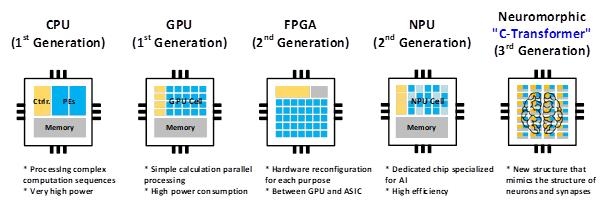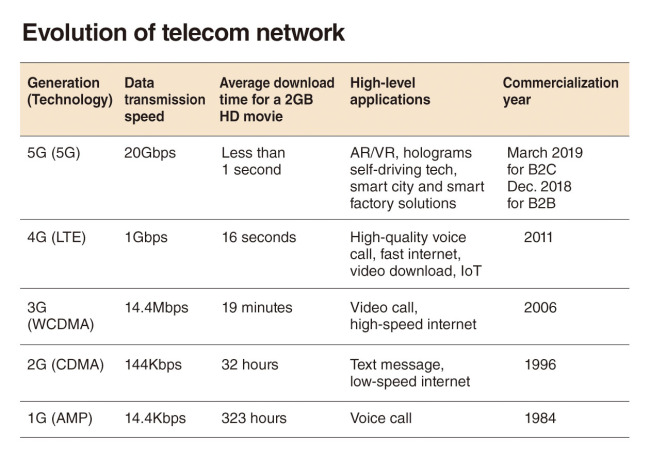Korea
Korea’s KAIST develops next-gen ultra-low power Gen AI LLM accelerator
Researchers in South Korea have developed the world’s first artificial intelligence (AI) semiconductor chip that operates at ultra-high speeds with minimal power consumption for processing large language models (LLMs), based on principles that mimic the structure and function of the human brain.
The research team was from the Korea Advanced Institute of Science and Technology (KAIST) PIM Semiconductor Research Center and the Graduate School of AI Semiconductor (led by Professor Yu Hoi-jun). This ultra-low power “complementary transformer” semiconductor using Samsung Electronics’ 28 nm process as announced by Korea’s Ministry of Science and ICT on Feb. 6th. The chip is 41 times smaller in area than the Nvidia AI processor, enabling it to be used on devices like mobile phones.
The new AI chip successfully ran GPT 2 using only 1/625 of the power consumption and at 1/41 the size of Nvidia’s A100 graphics processing unit (GPU). This breakthrough is considered a key development in the escalating global AI semiconductor war.
Previously, the technology was less accurate than deep neural networks (DNNs) and mainly capable of simple image classifications, but the research team succeeded in improving the accuracy of the technology to match that of DNNs to apply it to LLMs.
The team said its new AI chip optimizes computational energy consumption while maintaining accuracy by using unique neural network architecture that fuses DNNs and SNNs, and effectively compresses the large parameters of LLMs.

A photo describing an artificial intelligence chip which processes a large language model with neuromorphic computing technology provided by the Ministry of Science and ICT on March 6, 2024.
References:
SK Telecom Builds ‘5G Cluster’ which includes AR, VR, and AI for South Korea
Overview of ‘5G Cluster:”
SK Telecom today announced its strategy to build ‘5G Cluster’ nationwide to further foster 5G services and benefits. Since the world’s first “5G” commercialization in April 2019, the number of 5G subscribers in South Korea has surpassed 1 million- far more than in any other country.
SK Telecom’s ‘5G Cluster’ is an advanced 5G environment with cutting-edge ICT including AR, VR, and AI. The Korean telco plans to build ‘5G Cluster’ in business districts, parks, factories, and etc. to provide differentiated 5G service and benefits in both of B2C and B2B sectors.
In the B2C sector, SK Telecom will operate ‘5G League of Legends (LoL) Park’ at Jonggak, Seoul, starting from July 25. At ‘5G LoL Park’, customers can view messages from supporting fans nationwide with Augmented Reality (AR) by facing their smartphones toward a certain location. Customers can also enjoy VR live broadcasting and VR playback during the games.
Starting this August, SK Telecom will provide a service that allows customers to meet a variety of animals, including giant cats and wyverns (a winged two-legged dragon with a barbed tail), using AR in Olympic Park and Yeouido Park, Seoul. For example, if customers hold their smartphones toward ‘The Lone Tree’ in Olympic Park, a giant cat will appear on smartphone screen in AR.
Moreover, the company plans to transform Jamsil Students’ Gymnasium into a 5G Stadium. SKTelecom will further expand 5G experience spaces with immersive media by the end of this year.
In the B2B sector, SK Telecom will apply 5G network and ‘Mobile Edge Computing’ (MEC) solution to SK Hynix to build a ‘5G Smart Factory’. The two companies expect that this will drastically reduce time to detect defective semiconductor products and more efficiently manage production and logistics.
Furthermore, SK Telecom plans to build a total of 12 Mobile Edge Computing (MEC) for 5G networks, to be located at key regions nationwide (South Korea). In particular, the company will provide dedicated 5G edge cloud service for enterprises that are in need of security and ultra-low latency communications, including manufacturing, media, finance, and game industry.
“With ‘5G Cluster’ as our key focus, SK Telecom will provide customers with outstanding service and pleasure that are beyond the imagination,” said Yoo Young-sang, Executive Vice President and Head of MNO Business of SK Telecom. “We will strive to create added values to different industries and regions.”

Yoo Young-sang, head of mobile network operator business at SK Telecom, speaks during a press conference at the company’s 5G smart office in Seoul, Thursday. Photo Courtesy of SK Telecom
“We are currently constructing smart factory systems at SK Hynix plants. We expect our 5G services will enable many companies in the manufacturing sector to use the automated logistics system and control manufacturing process in real time,” Yoo said. “By accumulating practical experiences with SK Hynix, we will bring about technological innovation.”
……………………………………………………………………………………………………………………………………………………………………………
About SK Telecom:
SK Telecom is the largest mobile operator in Korea with nearly 50 percent of the market share. As the pioneer of all generations of mobile networks, the company has commercialized the fifth generation (5G) network on December 1, 2018 and announced the first 5G smartphone subscribers on April 3, 2019. With its world’s best 5G, SK Telecom is set to realize the Age of Hyper-Innovation by transforming the way customers work, live and play.
Building on its strength in mobile services, the company is also creating unprecedented value in diverse ICT-related markets including media, security and commerce.
For more information, please contact [email protected] or [email protected]
………………………………………………………………………………
Related posts:
SK Telecom and Samsung Bring South Korea Closer to 5G Standalone Commercialization
MWC 2019: Korean companies set to present new world of 5G connectivity & smart phones
OpenSignal reports on 5G Speeds and 4G LTE Experience in South Korea & Other Countries
Korea’s telecom/media partnerships forming in 2019 for 5G & ideal content
The Korea Herald reports that 2019 will be a cutthroat yet exciting year for South Korea’s telecommunications industry as the introduction of faster fifth-generation telecom networks in March will bring on upheavals in their own and other industries.
The Korean mobile operators at the forefront of the 5G commercialization are widely expected to escape their traditional areas of business, mainly centering on providing high-speed internet and high-quality calls, stretching out to the media industry by providing new services enabled by the 5G network.
Compared to the current 4G Long Term Evolution (LTE) mobile network, the 5G network provides 20 times faster speed for data transmission, allowing users to download a 2-gigabyte high-definition movie in less than a second.
Korea’s three mobile carriers — SK Telecom (SKT), KT and LG Uplus –in order of sales — are preparing to acquire or seek partnerships with small and mid-size broadcasters or media content startups to provide content for their respective 5G networks
SKT is forging ties with over-the-top mobile video content provider Pooq, run by the country’s three terrestrial broadcasters, in order to strengthen its own platform Oksusu that aims to rival Netflix.
SKT’s bigger plan is to spin off the Oksusu platform as one of four major subsidiaries along with the mobile network operator, and security and commerce arms.
This is also part of SKT CEO Park Jung-ho’s plan to establish an intermediary financial holding company – dubbed “ICT holding company of SK Group — that take control of the current four business areas of SKT.
KT is closely monitoring archrival SKT’s moves to start the new OTT business in a bid to lose out in the 5G content market.
KT’s New Media Business Group will be led by Kim Hoon-bae, former CEO of Genie Music — the mobile carrier’s music streaming platform — this year, which will focus on developing creative 5G content for its customers.
“KT is making efforts internally to develop content for 5G, for example the GiGA Live VR service on its IPTV platform,” said a KT official.

KT is also expanding Olleh TV subscribers’ access to TV content further to their mobile devices by launching Olleh TV Mobile application.
LG Uplus is gearing up for acquisition of CJ HelloVision, a cable TV channel provider under CJ Group, in order to enhance its cable TV business.
If LG acquires the CJ channel, it would become the second-largest cable TV service provider, beating out SKT’s Broadband with a total of 24.43 percent market share. KT is currently the market leader with a 30.86 percent share.
Taking a larger share of the pay TV market is becoming more important for the mobile carriers, because their internet protocol TV service subscribers are key customers for the home media business that would further develop into the future content business.
“Securing ideal content for the 5G network is the key to success in the new network market,” said an LG Uplus official. “We are seeking to enlarge the size of the home media business by securing more content provided by competitive third-party content providers with an ultimate goal of offering video content for 5G mobile customers, because the home media and mobile users prefer combined service plans.”
In an effort to attract around 300,000 Netflix users in Korea, LG Uplus has partnered with the US OTT business to offer access to Netflix content via its IPTV platform.
According to a report by KT Economics and Management Research Institute, the media industry is predicted to gain 3.6 trillion won in socioeconomic value by 2030 with the commercial use of 5G technology.
The report also mentioned the 5G technology will bring augmented reality and virtual reality content to end users, creating a new category in the media market.
By Song Su-hyun ([email protected]) and edited by Alan J Weissberger
……………………………………………………………………………………………
References:
http://www.koreaherald.com/view.php?ud=20190101000072
South Korean Mobile Operators to Launch 5G Simultaneously on Korea 5G Day


